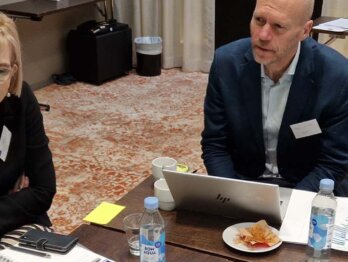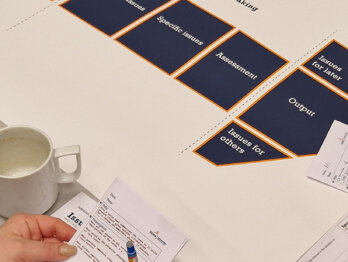Experimenting for the Future of Democracy

This OPSI guest blog is written by Professor Leon Fuerth and Dr Sheila Ronis. Both served as co-researchers on The Project on Foresight and Democracy, funded by Rockefeller Brothers Fund and are currently co-directing the Project on Civic Leadership for the 21st Century at The Ohio State University.
In the United States, liberal democracy is profoundly challenged by the accelerating rate of major forms of societal change, reflecting demographic transitions and technological revolutions. These changes are profoundly disorienting and contribute to the ideological polarization of Americans. Education for citizenship lacks a framework for understanding these changes. An experimental programme called Foresight and American Democracy shows promise by applying the perspectives of foresight analysis, systems theory and complexity theory to the identification and assessment of social trends. It has been tested at levels ranging from high school to university, professional adult and the general public.
Public confidence in democratic government depends upon its ability to consistently protect and advance public interests. Government now faces complex issues developing at a rapid pace, which exceeds the rate at which traditional processes are able to adapt. Authoritarian regimes invariably promise quick and simple solutions. These promises have been gaining traction.
This lag is, in part, the result of inefficiencies in the organisation of government itself. In principle, this can be dealt with by means of innovations designed to accelerate the rate at which government can first understand changing circumstances and then devise and execute effective responses.
The lag is also, in part, the result of a breakdown in public discourse. This breakdown is both cause and effect of the hyper-partisanship which now threatens the continuity of the American democratic experiment. In principle, this break-down can be addressed by innovations that improve the resilience and quality of public discourse. For the past five years, our work in Foresight and American Democracy has been devoted to the search for practical methods for bridging this gap.
We know that America’s problems are similar to what all democratic governments face. Therefore, we welcome any opportunity to exchange information and ideas with others through the OECD network. We are encouraged to find a high degree of commonality between our work and that of the OECD. There is fundamental agreement on the need for anticipatory governance. There is also agreement that systematic, strategic foresight is the basis for such governance. We also appear to agree that the key to converting foresight into policy is, ultimately, political. And we also appear to agree that the public at large must be given a seat at a table that is otherwise occupied by experts, elected officials and private sector interests.
Over the last five years, the two of us have been working to develop a way to train citizens to think comprehensively about complex problems.
Ours is NOT an effort to tell people what to think: it is an effort to help provide people with the means to think incisively about what may be coming, and what those trends and events may mean for public needs, and for public values. We call this method, the Round Table Process.
The Round Table Process
The Round Table Process begins with the selection of a panel of 10-15 participants. The selection process looks for diversity in background and willingness to engage in give-and-take without ideologically inspired prejudice.
Phase 1:
There is an initial stage in which participants are exposed to different modes of analysis. These include: foresight methodology, systems thinking and complexity theory. Each of these provides a different starting point for identifying and thinking about upcoming events that are arguably important enough to qualify as disruptive. The objective is to enable participants to think holistically about the future in ways that avoid ‘silver bullet’ solutions that are the gateways to single-factor solutions, which are the basis for doctrine, dogma and hyper-partisanship.
The take-away from this phase is: an awareness that seemingly different matters are very likely to be interacting with each other in ways that are impossible to predict, though perhaps possible to influence. Out of this grows respect for alternative points of view, and resistance to false conceptions of how the real world operates.
Phase 2:
In the next phase of preparation, participants are exposed to concrete data describing a set of powerful, disruptive trends. This set consists of subjects such as climate change, artificial intelligence, artificial biology and deep forms of social control based on algorithmic modeling. Although these subjects are normally occupied exclusively by experts, we have been able to present them in ways that can be rapidly absorbed by lay participants. In each case, we are looking at them as they may be after having passed certain thresholds. For example, climate change – once the effects on the planet become irreversible – or artificial general intelligence – once machines begin to pose their own questions and write their own programmes.
The take-away from this phase is to pitch discussion ahead of partisan or ideological conviction in an unknown territory. What emerges during phases 1 and 2 is an ability to:
- Identify longer range trends and possible events of major consequence;
- Think of organizations as systems; and
- Distinguish systems whose organisational structure can be complex, as distinguished from linear or complicated.
Phase 3:
Participants are then exposed to sets of facts presented by invited specialists, covering:
- Societal fractures owing to legacy issues, such as white supremacy in America;
- New fractures including those resulting from forecastable demographic changes; and
- Novel fractures that are driven by the hyperbolic development of high technology, capable of generating unpredictable forms of disruption.
The take away from this stage is an ability to look at these real-world developments from a set of complementary analytic frameworks.
Phase 4:
What follows is a discussion of the implications of these trends and events for critical democratic values – which we presented as the elements of a ‘Political Commons’ – defined as the set of core social and moral values that tend to bind societies together. For Americans, typical values in the Political Commons include: independence of action, privacy, rights that are seen as inalienable, equality of opportunity. Obviously, the reality differs significantly from the emotional and political ‘truth’ of these values. The gap between reality and aspiration is essentially the political space within which our system operates.
The take-away from this phase is a fusion of contrasting perspectives within the minds of each participant, and a mode of discussion which increasingly reflects joint awareness within the group, not the same conclusions. But the same awareness of the omnipresence of error in human judgment, and the need to follow the facts rather than be guided by doctrinal preconceptions of what the facts mean.

Reflections
We have tried versions of the Round Table that are scaled to the needs of different groups: (1) successful professionals, (2) students at high school and college levels, and (3) leaders of regional discussion groups. Two of these were efforts that played out over extended periods of time.
- Between July 2018 and February 2020, under the auspices of the Rockefeller Brothers Fund, we conducted a programme called The Project on Foresight and Democracy: A Systems Approach.
- Between January 2021 and May 2021, under the auspices of the John Glenn College of Public Affairs, at The Ohio State University, we developed and tested a course called Foresight and American Democracy.
Results are comparable: heightened awareness of the nonlinear behaviour of all social processes, broader perspective as to the impact of developments on values, openness to potential responses to the need for practical results – whether these are doctrinally orthodox or not – and a much higher level of civility and openness to alternative views.
Our aspiration is to gradually promote the Round Table Process as the basis for developing a nation-wide network of public discussion groups. A concern for us is whether American democracy will continue to exist for that long a period of time. This question – so real, so imminent, so frightening and so uncertain – might suggest that long-range programmes, such as ours, are too problematic to be worth the time, effort and resources needed to pursue them. But, if not now, then when?
There is a story about an event that occurred at the conclusion of the Constitutional Convention, in Philadelphia, on September 17, 1787. Benjamin Franklin –probably the wisest among our remarkable generation of founders – was asked, as he left the last meeting: “what have you given us?” His answer: “a republic…if you can keep it.” More than two centuries later, American democracy lives, but its survival is now, as always, an open question for each generation to reckon with in its own way.
We believe – and we sense that the same is true for the OECD – that the cure for what troubles democracies is not less democracy, but more democracy. We think that the key to this is to better prepare citizens for their roles in democracy, where awareness of complexity, alertness to change, and respect for democratic values are key. This will require innovation. The Round Table is our suggestion for what practical forms that innovation would require.
Professor Fuerth’s career in government spanned thirty years, including positions in the State Department, House and Senate staff, and the White House. His most recent government service was as Vice President Gore’s National Security Adviser for the eight years of the Clinton administration.
Dr Ronis is President of The University Group Partners, LLC. She is also an Adjunct Professor of Management at Walsh College where she retired as Distinguished Professor of Management and Director of the Center for Complex and Strategic Decisions.












